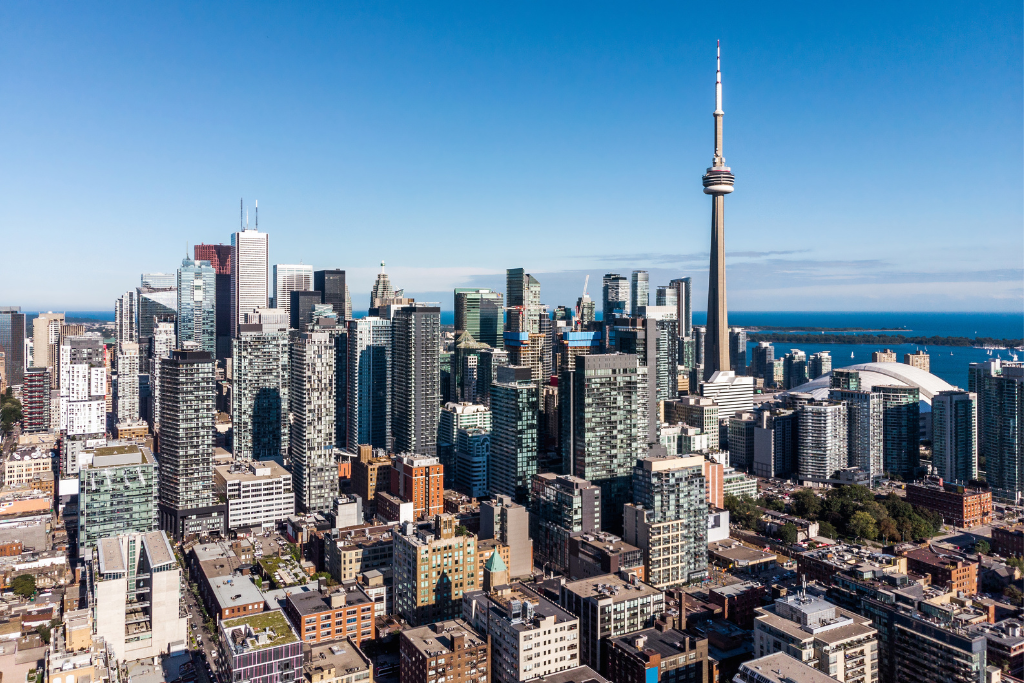1. First steps before moving to Toronto
Finding a job
Finding a job in Toronto is made easier because the city has many job opportunities in diverse fields like healthcare, finance, technology, education, and creative industries. Some popular jobs include Registered Nurse, Physician, Therapist, Financial Analyst, Project Manager, Data Analyst, Customer Service, Sales Representative, Marketing Manager, Teacher, Cook, and Heavy Equipment Operator.
Toronto is a multicultural city with a strong demand for these jobs, and there is plenty of help available. Similar to Ottawa, you can get assistance from government programs like Employment Ontario, which offers advice and services for jobseekers in both the public and private sectors. If you’re new to the city and looking for work, you can check out Jobs at the City for current job openings. Additionally, you can use online job search websites like Indeed, LinkedIn, and Glassdoor, network with people, and get career counseling.
Getting there
To travel from Ottawa to Toronto, the quickest option is to take a direct flight from Ottawa Macdonald-Cartier International Airport (YOW) to Toronto Pearson International Airport (YYZ). The flight duration is approximately 1 hour.
Alternatively, you can choose VIA Rail, which offers train services from Ottawa to Toronto. The train provides a comfortable and scenic way to travel, but the journey takes an average of 4.5 hours. It departs from Ottawa Train Station and arrives at Toronto Union Station. You can check their schedules and book tickets online.
Another option is to opt for a bus journey with companies like Greyhound and Megabus. Common bus departure locations in Ottawa include Ottawa Central Station, the major bus station in downtown Ottawa, as well as the Train Station, which may also serve as a departure point for certain bus services.
Additionally, you have the option to drive by car, and the road trip typically takes approximately 4.5 hours.
The Best Movers From Ottawa to Toronto
Moving to a city demands not only the task of packing all your belongings in one go, but also the challenge of transporting them in a single journey. Fortunately, we can provide you with a list of the best movers from Ottawa to Toronto.
Some of these service providers go the extra mile by offering comprehensive moving solutions, including packing, unpacking, loading, unloading, custom crate services, short-term and long-term storage facilities. This level of support ensures that your relocation is not only secure but also convenient.
Many of these companies offer online tracking, allowing you to keep a close eye on the status of your packages. However, if you prefer handling your move independently, you can choose to rent a moving truck.
Must dos before your arrival in Toronto
- Update Your Address: Changing your address is a crucial step when moving. You can easily complete this process using our free change of address service. To ensure you don’t miss any essential information, refer to our comprehensive change of address checklist in Ontario.
- Housing Arrangements: Ensure a smooth relocation by securing temporary lodging and exploring long-term housing options.
- Cost of Living Analysis: Make informed decisions by conducting thorough research on living expenses, including housing, groceries, transportation, and healthcare in advance.
- Weather Check: Review Toronto’s weather forecast and pack season-appropriate clothing, as the city has distinct seasons.
2. Upon your arrival in Toronto
Must dos right upon your arrival
- Familiarize yourself with your neighborhood and make note of important emergency numbers.
- Locate essential facilities such as the nearest hospital, police station, and fire department to ensure safety during emergencies.
- If you plan to move around the city of Toronto for work or leisure, consider purchasing a monthly transit pass to save money.
The TTC manages public transportation in Toronto, including subways, buses, and streetcars for the city and nearby areas. To ride, buy tokens or tickets at subway stations, Shoppers Drug Mart, or online at prestocard.ca. Remember, bus and streetcar drivers don’t sell fares, so have your payment ready.
The subway system in Toronto consists of three lines, with the primary ones being Line 1 (Yonge-University to Vaughan Metropolitan Centre Station) and Line 2 (Bloor-Danforth to Kennedy Station). Trains typically run every 2–3 minutes during rush hours and every 4–5 minutes at other times.
Here are Toronto’s public transport rates:
| Type of fare | Rate |
| Single ticket (PRESTO one-ride ticket) | $3.35 |
| Daily pass
(PRESTO day pass ticket) |
$13.50 |
| Fair pass Transit Discount | $2.10 |
| Monthly pass | $156.00 |
Toronto Transit Commission (Sept 2023)
Exchanging your driver’s license
When you move from one city within the same province in Canada, such as from Ottawa to Toronto, you generally do not need to exchange your driver’s license. Ottawa and Toronto are both located within the province of Ontario, so your Ontario driver’s license remains valid and applicable throughout the province.
However, it’s a good practice to update your address on your driver’s license to reflect your new residence, and you can do this through ServiceOntario.
For more detailed information, please refer to our article on how to change your address on your driver’s license in Ontario.
Setting up a bank account
When moving from Ottawa to Toronto, it’s crucial to establish a local presence by setting up a bank account. Before selecting a bank, compare institutions for the best returns, lowest administration costs, and the option to open your account remotely before arriving in Toronto.
Some banks have a presence in both cities. To make this transition smoother, inquire in advance about how to change your home branch with the bank. You should also inform your bank of your new mailing address to receive any statements or other communications.
To do this, visit the bank you wish to select as your new home branch. Some banks with a presence in both cities include the Royal Bank of Canada (RBC), Toronto-Dominion Bank (TD Bank), Bank of Nova Scotia (Scotiabank), and Canadian Imperial Bank of Commerce (CIBC).
Getting health insurance
Having health insurance is like having a safety cushion for your health, preventing you from being burdened with significant bills during medical emergencies. If you live in Toronto, it’s important to be aware of Ontario’s public health insurance (OHIP), which covers basic medical expenses through payroll taxes and federal support to its residents.
However, for more comprehensive coverage, you have two options: you can choose to purchase private health insurance or use the one sponsored by your employer. The cost and coverage of private health insurance depend on several factors, including your age, gender, lifestyle, pre-existing conditions, specific coverages, and the chosen provider.
| Type of healthcare | Cost |
| Employer-sponsored health insurance | $63.00 |
| Non-employer-sponsored health insurance (average cheapest) | $61.32-$196.20 |
| Gym | $72.73 |
Numbeo (Sept 2023), Hellosafe (2023) & Insurance Business (Apr 2023)
3. Best places to live in Toronto
Toronto has many neighborhoods, each with its own unique qualities. When you’re deciding where to live in Toronto, it’s important to consider your needs, budget, commute to work, and the lifestyle you desire. By carefully weighing these factors, you can find the neighborhood that’s just right for you.
To assist you in making an informed choice, we’ve compiled a list of the best neighborhoods to consider when moving around Toronto.
| City | Characteristics |
| Yonge-Eglinton | Vibrant hub for young professionals with easy access to shops, restaurants, and public transport. |
| Liberty Village | Trendy neighborhood with modernized factories now housing cafes, bars, and startups in media and technology. |
| Leslieville | Family-friendly oasis with vintage shops and boutiques. |
| Allenby | Kid-friendly area near Allenby Public School with green spaces and recreational options. |
Setting up home services
Whether you own a house or rent in Toronto, utility costs are a part of your budget. Toronto’s electricity and gas services are primarily provided by Toronto Hydro and Enbridge Gas. To ensure you’re getting the best rates, consider shopping around for competitive providers and plans to save on home services.
Keep in mind that electricity rates in Toronto can vary depending on the season, so exploring time-of-use pricing can help you save on your energy bills. Additionally, when managing your expenses, don’t forget to consider finding the best internet providers in Toronto.
| Utilities | Cost |
| Basic
(Electricity, Heating, Cooling, Water, Garbage) for 915 sq ft Apartment |
$208.67 |
| Internet
(60 Mbps or More, Unlimited Data, Cable/ADSL) |
$76.09 |
| Total | $284.76 |
Numbeo (Sept 2023) & OEB (2023)
Should you rent or buy?
In 2023, the average cost of a house in Toronto is approximately $1,141,400. If you’re thinking about renting, a one-bedroom apartment outside the city center of Toronto will cost around $2,280.60, which is notably higher than Ottawa’s average rental costs of approximately $1,712.22, according to Numbeo.
Ottawa is often considered more affordable in terms of housing compared to Toronto. Toronto has one of the most expensive housing markets in Canada, with high property prices and rental costs. However, it’s important to recognize that while Toronto may have a higher cost of living, it offers unique advantages that might make the investment worthwhile. Toronto boasts a robust job market with numerous opportunities across various industries, which can lead to higher earning potential.
Cost of rent in Toronto
| Area/Neighborhood | 1-bed apartment | 3-bed apartment |
| Toronto (Outside of Center) | $2,280.60 | $3,434.43 |
Cost of buying a property in Toronto
| Area/Neighborhood | Average home price |
| Greater Toronto* | $1,141,400 |
Do I need to hire a Notary or a Real Estate Lawyer when buying a house or condo in Toronto?
In Toronto and throughout Ontario, it is essential to hire a Real Estate Lawyer, not a Notary, when purchasing a house or condo. Typically, a Real Estate Lawyer initiates the preparation of property documents. If you and the lawyer are in the same geographic area, you would sign the documents in their presence. Otherwise, the lawyer may arrange for you to sign the documents in the presence of a Notary Public. Notary Public witness your signature, verify your identity, and administer necessary oaths, but they are not the sole preparers of your property documents.
4. Cost of living in Ottawa vs. Toronto
Toronto’s cost of living
| Category | Monthly cost |
| 1 bed apt rent outside city center | $2,280.60 |
| Groceries
Numbeo’s grocery list ($88.59 multiplied by 4) |
$354.36 |
| Utilities
Electricity, heating, cooling, water, garbage |
$208.67 |
| Internet with 60 Mbps | $76.09 |
| Transit pass | $156.00 |
| Entertainment
Meal, taxi, movie |
$104.00 |
| Gym membership | $72.73 |
| Total | $3,252.45 |
Ottawa’s cost of living
| Category | Monthly cost |
| 1 bed apt rent outside city center | $1,712.22 |
| Groceries
Numbeo’s grocery list Numbeo’s grocery list ($81.07 multiplied by 4) |
$324.28 |
| Utilities
Electricity, heating, cooling, water, garbage |
$255.58 |
| Internet with 60 Mbps | $86.58 |
| Transit pass | $125.50 |
| Entertainment
Meal, taxi, movie |
$120.25 |
| Gym membership | $83.21 |
| Total | $2,707.62 |
5. The weather in Toronto
The weather in Ottawa and Toronto varies, but both cities go through all four seasons. Toronto’s summers, which stretch from June to August, offer a range of outdoor and cultural activities, including relaxation on urban beaches. The weather in this period can be warm and humid, with temperatures ranging from 20 °C to 30 °C. July and August are the warmest months.
Winters in Toronto, from December to February, are cold and often wet, icy, and snowy. Temperatures frequently drop below freezing, though it’s milder compared to Ottawa. Icy conditions are common, making Toronto a popular destination for winter activities like skating.
Toronto’s weather can be quite changeable and occasionally extreme, so it’s a good idea to check the local forecast when planning your visit or relocation.
6. What to do as a local in Toronto
As a local in vibrant Toronto, you’ll find a wide array of activities to enjoy. Sports enthusiasts can cheer for the local teams – the Raptors, Maple Leafs, and Blue Jays, while outdoor enthusiasts can explore the beautiful waterfront, parks, and trails.
Food lovers can enjoy diverse culinary delights in neighborhoods like Chinatown, Koreatown and Little Italy. Culture enthusiasts can visit museums like the Royal Ontario Museum and the Art Gallery of Ontario, and enjoy live music and theater at venues. Toronto’s annual festivals, including TIFF, Pride Toronto, and Nuit Blanche, offer a taste of the city’s rich cultural diversity.
7. Fun facts about Toronto
- Toronto is one of the most multicultural cities in the world, with over half of its population born outside of Canada.
- The CN Tower, which was once the world’s tallest freestanding structure, is one of Toronto’s most iconic landmarks.
- The Royal Ontario Museum is Canada’s largest museum and is known for its impressive collection of art and natural history exhibits.
- Toronto is home to the Toronto International Film Festival (TIFF), one of the most prestigious film festivals in the world, attracting celebrities and film enthusiasts from around the globe.
- Over 180 languages and dialects are spoken in Toronto, making it one of the most linguistically diverse cities in the world.
What Are the Benefits of Moving to Toronto From Ottawa?
From the tables of the cost of living above, it is easy to see that living in Toronto is much more expensive than staying in Ottawa. Despite the steep cost of living, many people still consider moving from Ottawa to Toronto as a step-up.
In addition to the cost, there are other differences as well. Toronto has a slightly warmer average temperature than Ottawa and boasts more major sports stadiums and airports. If you wish to live a fast-paced lifestyle with numerous opportunities for entertainment, sports, culture, and food, then moving from Ottawa to Toronto might indeed be a very suitable decision for you.
Pros and Cons in Moving to Toronto from Ottawa
| Pros | Cons |
|
|
Conclusion
Toronto is an excellent city to move to, offering numerous career opportunities. However, alongside the excitement of relocating to a new neighborhood, you’ll face the challenging tasks of budgeting for potential expenses, comparing mobility plans, finding suitable housing, and selecting the best moving company. To ensure a seamless transition and a fresh start in the city, it’s necessary to evaluate all the things you need to know before moving to Ontario.





